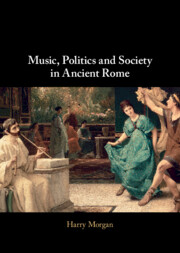Book contents
- Music, Politics and Society in Ancient Rome
- Music, Politics and Society in Ancient Rome
- Copyright page
- Contents
- Figures
- Acknowledgements
- Abbreviations
- Introduction
- 1 The Games of L. Anicius Gallus and the Cultural Politics of Music in the Second Century BCE
- 2 Popular Music and Popular Politics in the Late Republic
- 3 Augustus, Apollo’s Lyre and the Harmony of the Principate
- 4 Nero and the Age of Musomania
- Epilogue
- Bibliography
- Index
3 - Augustus, Apollo’s Lyre and the Harmony of the Principate
Published online by Cambridge University Press: 24 November 2022
- Music, Politics and Society in Ancient Rome
- Music, Politics and Society in Ancient Rome
- Copyright page
- Contents
- Figures
- Acknowledgements
- Abbreviations
- Introduction
- 1 The Games of L. Anicius Gallus and the Cultural Politics of Music in the Second Century BCE
- 2 Popular Music and Popular Politics in the Late Republic
- 3 Augustus, Apollo’s Lyre and the Harmony of the Principate
- 4 Nero and the Age of Musomania
- Epilogue
- Bibliography
- Index
Summary
This chapter focuses on the relationship between Augustus/Octavian and Apollo’s incarnation as citharoedus (lyre-player). The main contention of the chapter is that the Augustan period fostered a revival of music which resonated with, and to some degree embodied, a restorative political message. Not only did Augustus integrate images of Apollo Citharoedus into his own imagery (both in Rome and in the commemorative monuments around the gulf of Actium), but he also exploited harmonia as a metaphor for his newly established regime, imbuing musical rituals like the Ludi Saeculares of 17 BCE with powerful symbolic resonances. The chapter also makes a case for seeing Mark Antony’s use of music as a key part of a project to present himself through the symbolic language of Hellenistic kingship, against which Octavian in turn defined his own musical ‘programme’.
- Type
- Chapter
- Information
- Music, Politics and Society in Ancient Rome , pp. 142 - 190Publisher: Cambridge University PressPrint publication year: 2022

